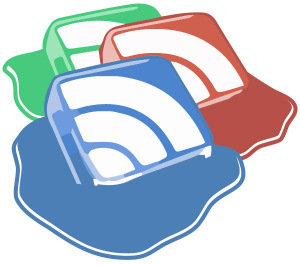 After several weeks of teasing me for burying my head in the sand and stubbornly refusing to transfer my Google Reader RSS feeds elsewhere, the Beloved quietly confessed last night that he has given up on Feedly and moved himself back to Reader, too, for the time being. Once I was done milking the required apology for his weeks of mocking, I asked him why, and found that he had reached the same conclusion—that in the battle between interactivity and linearity, linearity is sometimes the better way.
After several weeks of teasing me for burying my head in the sand and stubbornly refusing to transfer my Google Reader RSS feeds elsewhere, the Beloved quietly confessed last night that he has given up on Feedly and moved himself back to Reader, too, for the time being. Once I was done milking the required apology for his weeks of mocking, I asked him why, and found that he had reached the same conclusion—that in the battle between interactivity and linearity, linearity is sometimes the better way.
Here’s what he didn’t like about Feedly: It was too dynamic for him. Every time he logged in, there were images and suggestions and new stuff Feedly was trying to highlight for him. And all he wanted to know was what had gone up on his favorite blogs since the last time he’d checked them. He worried that Feedly, in its effort to find him new and interesting stuff, was forgetting to show him the older stuff he hadn’t gotten to yet and still wanted to see. He didn’t want to know what they suggested for him. He just wanted to see a list of posts he hadn’t read yet, and he wanted to read them.
It’s the same reason I’ve never gotten the hang of Twitter. In the interests of having a ‘dialogue’ with everyone, I miss the news. I log into Twitter and there are just too many bits and pieces and snippets to follow. I don’t ‘follow’ that many people, but between their tweets and then the retweets and the comments on the tweets, one useful post will be accompanied by half a dozen other ones I don’t care for. It’s too much; unless I check it dozens of times per day, there is no way to keep up. Google Reader offers a more controlled environment for me—I log in, and I can see at a glance exactly how many posts I have to catch up on. And I don’t have to read the comments and replies to any of them unless I want to.
It’s ironic to me that he and I are both reaching this same conclusion, because I think the reason Google decided to shut down Reader was its lack of interactivity. There is no ‘dialogue’ on Google Reader. There is no flashy homescreen with an ever-changing menu of suggestions and recommendations and ‘like’ buttons and flashy pictures. But what I think they forgot was that sometimes, people don’t need that stuff. Sometimes, they just want a quick and dirty way to organize their chosen content and get on with their day. Twitter will not, for me, replace Google Reader. At the moment, I despair that anything ever will, and I have no idea what I am going to do when they finally shut down for good this summer.
































For me, there are plenty of RSS readers out there that work as well as (or better than) Google Reader. In fact, I’ve rarely used Google Reader itself on any platform, and have different readers for iOS, Android, Windows, and OS X that I much prefer.
The real issue isn’t Google Reader itself, but rather the backend system that so many other RSS readers have used for years to stay in sync. Today, I ran keep up-to-date on my RSS feeds on any device I own because read/unread status (and starred, etc.) are kept in sync via the Google Reader backend. That’s what needs to be replaced.
“Google Reader offers a more controlled environment for me—I log in, and I can see at a glance exactly how many posts I have to catch up on. And I don’t have to read the comments and replies to any of them unless I want to.”
Very well stated. Exactly why I prefer Google Reader.
Now I’m used to it, I prefer Feedly. Although, I always skip past the first page and go straight to my categories down in the sidebar, which is still based on my Reader folders, and with the feeds set to headlines only I can whip through them much faster than I could in Reader.
I understand your dislike of Twitter & share it. I think it i this obsession that Tech companies seem to have with the constantly-updating timeline these days, which annoys me. I want things to be there waiting for me to read them, not constantly scrolling past and disappearing off into the ether before I notice them. The timeline concept is fine if you, say, work in a Tech company where you can watch it scrolling by, but for the rest of us who have real lives beyond our computers, it is at best a distraction and at worst useless.
I assume by ‘using Feedly’ and ‘using Google Reader’ you are talking about using a computer browser. I almost never read my RSS feeds that way any more. Instead I use apps on my mobile devices. I find I can go through my feeds faster than when I used a browser. The Feedly app does not push anything at you that you didn’t subscribe to or search for, doesn’t make suggestions, it is beautiful and several times more efficient that the Google Reader app. Web pages open up inside the app instead of launching a browser.
I’d also point out that using Feedly is not a ‘switchover’ in any real sense of the word right now: everything is still coming from Google. I don’t know what Feedly’s timetable for replacing Google is, but the clock is ticking.
I’ve switched from Google Reader to NetVibes, and have been very happy with it for the same reasons that you like Google Reader. I have my NetVibes account set to “Reader” mode, so all I see are the posts I haven’t read from the blogs I follow. I ignore all the widgets and whatchits, which they allow me to do. Sure, there is the option for the whole “dashboard” thing where I can get everything (in “Widget” mode), but that’s not what I wanted, and NetVibes allows me to totally ignore that feature. In addition, they gave me instructions on how to import my Google Reader feeds into NetVibes, so getting up and running again was easy. I’ve not looked at Google Reader since.
So, you might want to give NetVibes a try if all you want is linearity.
I originally used Bloglines for my feeds and when they said they were discontinuing it is when I switched to Google Reader. I liked Google Reader as it was similar enough to Bloglines to allow me to easily go through a lot of feeds but still see enough information in each post.
Now, ironically, I am switching from Google Reader back to Bloglines because someone decided to resurrect it. It appears that it has a NetVibes back-end because the help file in Bloglines takes you to the NetVibes help file.
But, the good news is the feeds are easy to process, its close enough to Google Reader and it can keep up with me when I go through 300 articles for a single feed. The other good news is that it is still free like Google Reader.
So, I have made the switch and crossed my fingers that Bloglines won’t die a second time.